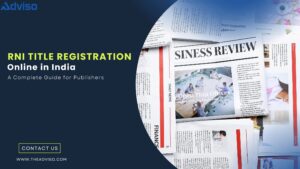Insurance Broker License
Insurance is one of the prominent sectors in the country. Hundreds of players, including government and private, offer a wide range of insurance products, spanning health, term life, automobile, etc. The competition in the insurance regime is cut-throat as the new companies and products continue to flood the sector. To survive the market, companies offer lucrative insurance products to potential audiences while spending millions on marketing. However, that approach doesn’t necessarily work all the time, leaving companies in distress. That’s where Insurance broker comes into play. Serving the role of an insurance broker is a matter of addressing various legalities from an operational standpoint.
One of the most important being is securing the IRDAI approval, without which no broker could have a legal status while serving their role, making them punishable under the Act. With that being said, let’s take a detailed walkthrough of the procedure for an Insurance Broker License and its legalities.
Understanding Insurance Brokers and Their Types
Before we delve into the procedure for an Insurance Broker License, let’s explore what is insurance broker and their types.
Technically, an “Insurance Broker” could be a direct broker, a reinsurance broker, or a composite broker. They are legitimized by the authority i.e. IRDAI and fall under the Insurance Regulatory and Development Authority of India (Insurance Brokers) Regulations, 2018. The said legislation classifies insurance brokers as follows:
- Direct Broker (Life),
- Direct Broker (General),
- Direct Broker (Life & General),
- Reinsurance Broker and
- Composite Broker.
Direct Broker
Direct Broker is a type of insurance broker that works under the authority’s guidelines and aids insurance companies to get potential leads, enabling them to upscale their business. They essentially bridge the gap between the company and clients seeking insurance. Apart from generating leads, the direct broker caters to various jobs including claims consultancy, Risk Management services, etc. In return, the Direct Broker charges a fee or remuneration based on mutually agreed terms.
Reinsurance Broker
“Reinsurance Broker” is a registered insurance broker that arranges re-insurance for its clients with reinsurers or insurers regardless of location. Additionally, they offer services like claims consultancy, Risk Management services, etc within the purview of the Insurance Regulatory and Development Authority of India (Insurance Brokers) Regulations, 2018.
Composite Broker
“Composite Broker” can offer dual services: Direct broking and Reinsurance broking. They also fall under the IRDAI’s ambit and follow the guidelines of the Insurance Regulatory and Development Authority of India (Insurance Brokers) Regulations, 2018 while offering services like broking, claim consultancy, risk management, etc.
All these brokers must have an Insurance Broker License to stay valid while serving underlying objectives cited in the legislation.
Conditions to ponder before delving into the procedure for an Insurance Broker License
Conforming to the below conditions is mandatory before delving into the procedure for an Insurance Broker License:
| Corporate Structure | The applicant firm must be registered with one of the following structures: Company under Companies Act 2013 or 1956 Partnership under LLP Act 2008Cooperative society under the Co-operative Societies Act 1912 |
| Capital Requirements | The applicant firm should meet the following capital requirements based on the type of license chosen: Direct Broker: 75 LakhsRe-insurance Broker: 4 CroreComposite Broker: 5 Crore |
| Net Worth Requirements | “Net worth” as defined in the Companies Act 2013 and amended over time – Direct Broker: 50 LakhsReinsurance/Composite Broker: 50% of minimum capital requirements – |
| Deposit Requirements | Direct Broker: 10 Lakh RupeesReinsurance/Composite Broker: 10% of minimum capital/contribution |
| Office Space/Facilities | Ample office spaceEquipment required for supporting broking endeavorsTrained manpowerIT Infrastructure |
| Qualification | Two qualified persons with extensive knowledge in life and general insurance. The principal Officer should serve as a full-time director, partner, or officer with apt field knowledge. |
| Purpose of the Business | The main object cannot be other than pursuing brokering activities in the insurance regime. The founding documents like AoA and MoA must reflect the same. |
| Professional Indemnity Insurance | Must have professional indemnity insurance staying valid till the tenure of Certificate of Registration.Newly registered brokers must draft a policy within a year from the certification’s issuance date. |
Documentation consideration for an insurance broker license
Keep the following documents handy before plunging into the procedure for an Insurance Broker License:
- Memorandum and Articles of Association: Provide copies compliant with the Companies Act 2013.
- Employee Training Information: Include details about training programs for employees.
- Principal Officer Details: Submit relevant information in Schedule-I Form F.
- Application Form: Complete and submit FORM B – Schedule I.
- Supporting Documents: Attach all necessary documents as specified in FORM-C Schedule I.
- Fit and Proper Certificate: Obtain certification as outlined in Schedule-I Form G.
- Disqualification Declaration: Provide declarations from key management personnel confirming no disqualifications.
- Directors and Key Personnel Details: List information about Directors, Partners, Promoters, and Key Management Personnel.
- Qualified Personnel List: Include a list of qualified staff in Schedule I-Form F.
- Auditors and Bankers Information: Detail statutory auditors and principal bankers, including bank account numbers.
- Infrastructure Evidence: Provide documentation showing adequate infrastructure, including IT facilities and office space.
- Fee Payment Proof: Include proof of payment for fees specified in FORM D – Schedule I.
Procedure for an Insurance Broker License: A Step-by-Step Guide
Applying for an Insurance Broker License involves following the given steps:
Step1: Application Submission:
Head to the authority’s portal to submit the application in FORM B – Schedule I. Make sure to add legitimate details to the application form to avoid any chance of rejection.
Step 2: Document Submission:
Upload the supporting document (as cited above) in the prescribed format to avoid technical glitches and portal rejection.
Step 3: Fee Payment:
Head to FORM D – Schedule I of the IRDAI (Insurance Brokers) regulations to pay the applicable fee based on the type of license. Authority typically leverages the following fee structure:
Note: this fee applies to the in-principle approval, a certificate that precedes the actual certification. Once you fulfill the conditions tied to in-principle approval, you can prompt the authority to grant the Insurance Broker License
- Direct Broker: Rs. 25,000
- Re-insurance Broker: Rs. 50,000
- Composite Broker: Rs. 75,000
Step 4: Summit the Registration Fees:
After in-principle approval, pay the registration fees:
- Direct Broker: Rs. 50,000 (new application)
- Re-insurance Broker: Rs. 1,50,000 (new application)
- Composite Broker: Rs. 2,50,000 (new application)
Note: the license can be renewed for the next three years, allowing you to operate seamlessly. However, the fee shall vary in case of renewal.
The fee submission can be done either online or via demand draft (DD) payable to the Insurance Regulatory and Development Authority of India, Hyderabad.
Step 5: Grant of certificate
The authority shall vet the application for compliance and accuracy. If the authority finds zero non-compliance while probing the in-principal approval’s conditions, the grant of certification shall come into effect, marking the end of the application process.
Conclusion
Getting insured has become a commonality today. From health insurance to term life insurance, there is a wide variety of insurance products available to the masses. Most insurances serve as a financial cushion that withstands crises like death, accident, etc, ensuring peace of mind for the insured. Insurance companies offer a myriad of plans to address diverse demands. But often they failed to elevate their sales due to intense competition. That’s where the insurance broker comes in. These brokers are IRDAI-certified and offer extensive services, spanning marketing and sale of insurance products. If you want to be a certified insurance broker, you must have an IRDAI-based insurance broker license without any exception.
Let us know if you encounter any issues while catering to the procedure for an Insurance Broker License. Adviso is an expert firm that specializes in the licensing regime. We enable clients to focus on their core operations while providing top-tier licensing aid to stay compliant. If dealing with legalities is not your cup of tea, let us be your trusted partner.
Read Our Article: PSARA License Apply Online: Know All About It




